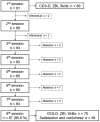Leo program, a short multi-family skill-based psychoeducational program for caregivers of relatives living with a severe mental disorder: a retrospective pilot study
- PMID: 38784162
- PMCID: PMC11112345
- DOI: 10.3389/fpsyt.2024.1374540
Leo program, a short multi-family skill-based psychoeducational program for caregivers of relatives living with a severe mental disorder: a retrospective pilot study
Abstract
Background: Caring for a relative with a severe mental disorder (SMD) is associated with high levels of burden and poor physical and mental health. There is a dire need for family psychoeducational programs that can be provided as early as possible. This manuscript describes the pilot testing of "Leo" a motivational-based psychoeducational program for caregivers of individuals with a SMD. The Leo program aims to provide caregivers with skills to best support their relative and to adopt self-care behaviors.
Methods: We retrospectively analyzed medical records of caregivers who enrolled in a short, multi-family, skill-based psychoeducational program, consisting of eight 3-hour sessions over 8 weeks. Outcomes of interest included: i) adherence to the program, ii) satisfaction and perceived usefulness, and iii) pre-post changes in self-reported levels of depression (CES-D), burden (ZBI), and skills (10 Likert-scaled items). A network analysis was used to investigate the relationships between pre-post changes in self-evaluated skills and pre-post changes in burden and depression levels.
Results: Over the 91 enrolled participants, 87 (95.6%) completed the program attending at least 5/8 sessions, 80.5% attending all sessions. Seventy-six caregivers fulfilled the questionnaires at baseline and after the program, and were included in the analysis. Although there was no evidence for significant change in self-reported depression levels (Cohen's d=0.19, p=0.210), burden scores and all evaluated skills were improved post-intervention, with medium to strong effect size (Cohen's ds from 0.47 to 0.87; p<0.001). Network output indicated that increased self-evaluated competence in 5 skills were associated with a global improvement in caregivers' burden and/or depression scores. Post-intervention, 89.7% of caregivers were "very satisfied" and 82.1% found the program "extremely useful".
Conclusion: This pilot retrospective study shows high levels of satisfaction, perceived usefulness, and adherence to "Leo", a short, multi-family, skill-based psychoeducational program with promising results in improving caregivers' burden, self-evaluated competence in coping with caregiving demands and in self-care behaviors. This study provides preliminary insights into the mechanisms by which family psychoeducation might alleviate burden of care. A larger-scaled, controlled, randomized study with follow-up assessments is warranted to determine how burden, depression, and skills, as well as their inter-relationships, evolve over time.
Keywords: burden; caregivers; family psychoeducation; severe mental disorder; skills.
Copyright © 2024 Lespine, de Martène, Zeltner, Chenu, Berbey and Rey.
Conflict of interest statement
The authors declare that the research was conducted in the absence of any commercial or financial relationships that could be construed as a potential conflict of interest.
Figures



References
-
- Mittendorfer-Rutz E, Rahman S, Tanskanen A, Majak M, Mehtälä J, Hoti F, et al. Burden for parents of patients with schizophrenia—A nationwide comparative study of parents of offspring with rheumatoid arthritis, multiple sclerosis, epilepsy, and healthy controls. Schizophr Bulletin. (2019) 45:794–803. doi: 10.1093/schbul/sby130 - DOI - PMC - PubMed
LinkOut - more resources
Full Text Sources

